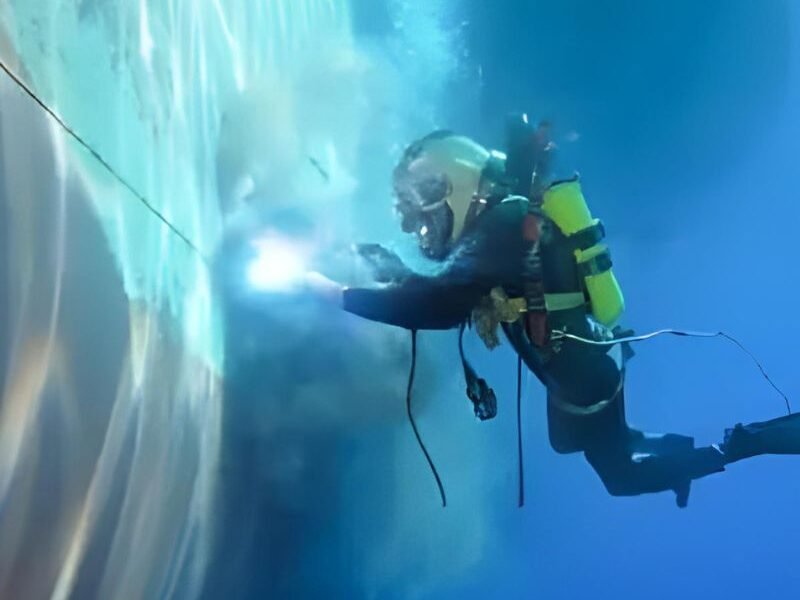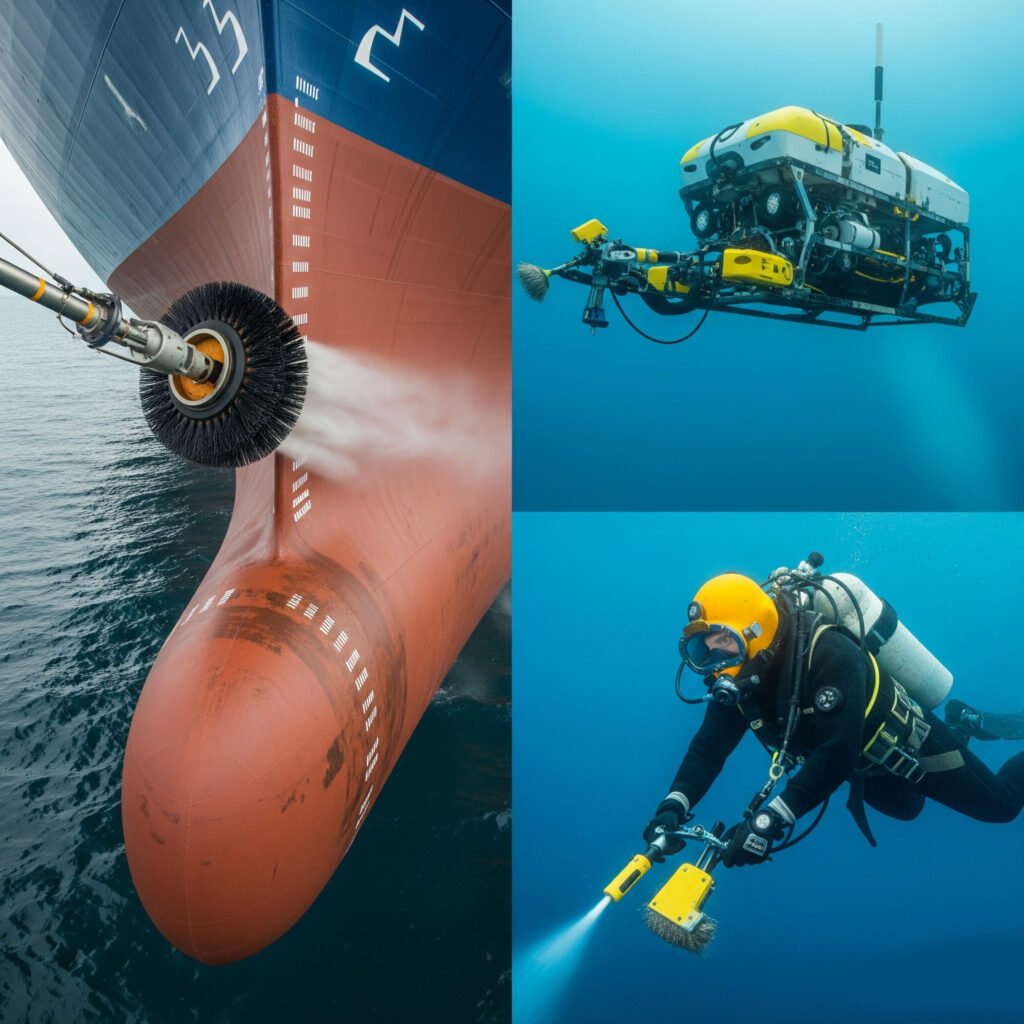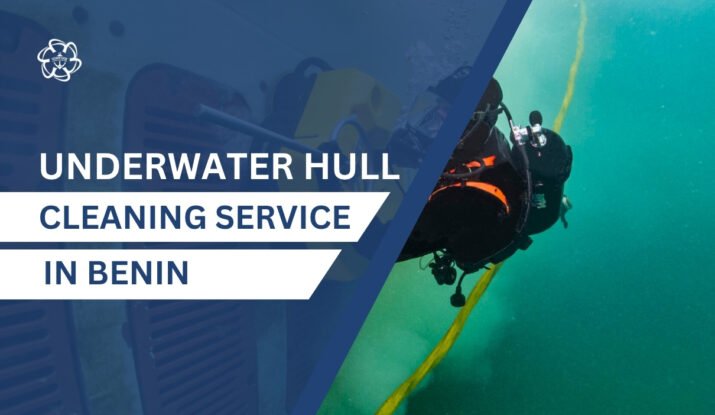Underwater Hull Cleaning in Benin: Benin, with its vital maritime gateway—the Port of Cotonou—acts as a linchpin for trade across West Africa. But the warm, nutrient-rich waters of the Gulf of Guinea present a silent challenge to maritime operators: biofouling. Barnacles, algae, seaweed, and microbial films accumulate rapidly on the submerged surfaces of vessels, especially the hull and propeller. This biological growth increases water resistance, leading to higher fuel consumption, reduced speed, and elevated CO₂ emissions.
Underwater hull cleaning—performed while the ship is still afloat—has emerged as a mission-critical maintenance solution, enabling ships to maintain optimal performance, remain compliant with environmental regulations, and reduce operational costs. In Benin, the demand for professional underwater hull cleaning services is increasing as shipowners seek eco-efficient, timely, and regulatory-compliant solutions.

Spotlight on CleanShip: A Global Leader in Marine Cleaning
CleanShip, headquartered in Mumbai, India, has carved out a reputation for its precision marine services, notably bulk carrier hold cleaning and underwater hull cleaning. Known for its dedication to safety, environmental responsibility, and operational efficiency, CleanShip operates across multiple international ports and is poised to support shipping routes near Benin through strategic alliances.
Backed by client testimonials, extended 9 AM–10 PM service hours, and modern cleaning technology, CleanShip sets a high bar for professionalism. Its practices align with global shipping standards, making it an ideal candidate to partner with local marine service providers in Benin, such as ADK Shipping Agency and Bevaldia.
Why Hull Cleaning Is Essential in Benin’s Waters
Fuel Efficiency & Hydrodynamic Gains
Fouling increases drag by up to 60%, especially on larger vessels. According to IMO’s GreenVoyage2050 initiative, a moderately fouled hull can lead to a 1–5% increase in fuel consumption, while heavily fouled hulls may cause even greater inefficiencies. Hull cleaning restores smoothness and reduces resistance, boosting speed, stability, and fuel savings.
Emission Reduction & Regulatory Pressure
As global maritime standards tighten under IMO’s MARPOL Annex VI, CII (Carbon Intensity Indicator), and EEXI (Energy Efficiency Existing Ship Index), operators must lower emissions. A clean hull significantly reduces a vessel’s carbon footprint and aids compliance with these environmental mandates.
Navigational & Operational Reliability
Fouling also affects maneuverability, crucial in high-traffic ports like Cotonou or during anchorage in the Gulf of Guinea. Clean hulls enhance rudder response, propeller thrust, and vessel safety, especially during emergency maneuvers or restricted navigation areas.
Methods of Underwater Hull Cleaning in Benin
A. Diver-Assisted Mechanical Cleaning
Divers, equipped with hydraulic brush karts, manually remove marine growth. Tools like CleanShip’s StirTech system or equipment used by ADK in Cotonou are tailored to minimize coating damage while ensuring thorough removal. Skilled divers are trained to work in low-visibility environments, often using surface-supplied air and underwater comms for coordination.
B. ROV-Based (Remotely Operated Vehicle) Cleaning
ROVs equipped with water jets, magnetic wheels, and bio-capture units are revolutionizing the industry. Unlike divers, ROVs can operate continuously and safely, even during bunkering, cargo handling, or at anchorage, eliminating downtime. Some advanced systems feature bio-waste containment units, which prevent invasive species discharge into local ecosystems.
Strategic Advantages of CleanShip-Grade Services in Benin
| Benefit | Impact |
|---|---|
| Fuel & Cost Savings | Prevents corrosion, extends anti-fouling coating life, and reducesthe frequency of dry-docking |
| Emission Compliance | Reduced carbon footprint helps meet IMO/EU ETS carbon credit rules |
| Hull Protection | Prevents corrosion, extends anti-fouling coating life, and reduces the frequency of dry-docking |
| Minimized Downtime | Cleaning during cargo ops or anchorage keeps schedules intact |
| Regulatory Alignment | Supports documentation for Biofouling Management Plans, increasingly mandated in global ports |
Practical Challenges in Benin: Local Insights
Turbid Water Conditions
Murky waters near Benin’s coastline reduce diver visibility. This necessitates high-lumen underwater lighting and sonar positioning tools, making ROVs the preferred choice.
Equipment Availability
CleanShip and international operators may face logistical delays if operating alone. Partnerships with local companies like ADK or Bevaldia help ensure rapid deployment of equipment, trained divers, and permits.
Balancing Budget & Efficiency
Hull cleaning costs vary from $5,000 to $50,000+, depending on vessel size and fouling level. But the ROI is clear: clean hulls extend maintenance intervals, reduce fuel bills, and avoid non-compliance penalties.
Regulatory & Environmental Standards in Benin
- IMO Guidelines on Biofouling (MEPC.207(62)) mandate proactive fouling management to reduce invasive species spread.
- Ports like Cotonou enforce safety and pollution control via inspection protocols, diver certifications, and waste handling standards.
- CleanShip’s services—complete with pre/post-cleaning reports, digital inspection logs, and environmental clearance—match global compliance expectations.
Choosing the Right Hull Cleaning Partner in Benin
| Criteria | Why It Matters |
|---|---|
| Certifications | Look for ISO 9001, 14001, and 45001 for safety, environment & quality |
| Eco-Responsibility | Use of ROVs with containment ensures zero discharge |
| Technical Adaptability | Experience with various hull coatings and antifouling systems |
| Schedule Flexibility | Must operate during loading, bunkering, or anchoring windows |
| Transparent Pricing | Quotes should include scope, equipment used, fouling type, and vessel class |
CleanShip’s Edge: Global Experience Meets Local Potential

If CleanShip partners with West African providers, it could offer:
- End-to-End Marine Solutions: From cargo hold cleaning to hull maintenance, providing full-cycle vessel care.
- Enhanced Safety Practices: Real-time monitoring, diver safety plans, and underwater risk assessments.
- Highly Rated Service: Testimonials highlight punctuality, professionalism, and detailed reporting.
- Scalable Capacity: Ability to service multiple vessel types—bulk carriers, tankers, container ships—within tight deadlines.
Best Practices for Successful Hull Cleaning in Benin
- Regular Monitoring: Conduct underwater inspections via drones or ROV cameras every 60–90 days.
- Eco-Capture Systems: Prioritize systems that capture and neutralize marine debris to meet eco-compliance.
- Integrated Maintenance Planning: Schedule hull cleaning alongside surveys or coating reapplications.
- Documentation: Maintain detailed logs for each cleaning location, technique, fouling type, and operator details.
- Pre-Voyage Strategy: For vessels transiting high-fouling zones (e.g., Angola, Nigeria), consider mid-voyage cleaning at Cotonou.
Conclusion: Hull Cleaning as a Strategic Asset in Benin
Underwater hull cleaning in Benin is no longer just routine upkeep—it’s a strategic pillar for cost savings, sustainability, and regulatory survival. With growing pressure from the IMO, port authorities, and clients demanding green shipping, proactive maintenance is a necessity.
Companies like CleanShip, in collaboration with local experts like ADK or Bevaldia, bring the tools, experience, and compliance framework needed to keep your fleet operating at peak performance.
FAQs
1. Can cleaning be done while the vessel is at anchorage?
Absolutely. Modern ROV-based systems allow hull cleaning during anchorage, bunkering, or idle port times without disrupting cargo operations.
2. Who are the trusted underwater hull cleaning providers in Benin?
Companies like CleanShip, if operating regionally, and local providers such as ADK Shipping Agency and Bevaldia are reliable options with trained crews and compliance-ready processes.
3. Does underwater hull cleaning save fuel?
Yes. Removing marine growth reduces drag, improving hydrodynamic efficiency. This can lead to fuel savings of 1–5%, depending on vessel type and fouling severity.
4. What are the main methods used for hull cleaning in Benin?
The two primary methods are diver-based cleaning with hydraulic brushes and ROV (Remotely Operated Vehicle) cleaning. ROVs are ideal for eco-friendly, non-disruptive cleaning during bunkering or anchorage.
5. How often should a vessel undergo underwater hull cleaning?
Frequency depends on water conditions and vessel activity, but most ships benefit from cleaning every 3–6 months in tropical regions like Benin. ROV inspections can help determine the right timing.


